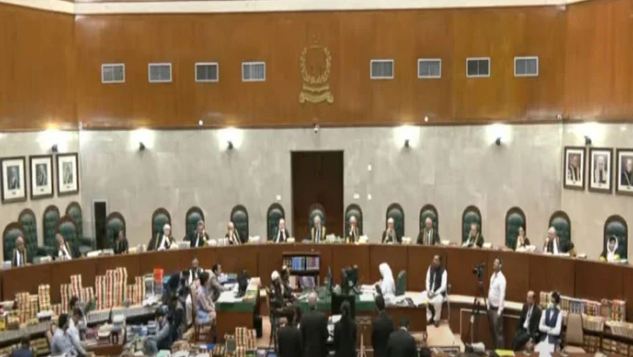BREAKING: Supreme Court knocks out Parliament Act regarding practice and procedures
Special Correspondent
ISLAMABAD: The Supreme Court of Pakistan has struck down the Parliament Act regarding Supreme Court Practice and Procedures. The court said the Parliament overstepped its jurisdiction while making such a law. The court announced this verdict by a majority verdict. 10 judges voted against the Act of Parliament while 5 judges supported the Act.
Earlier, the Chief Justice of Pakistan (CJP) Qazi Faez Isa on Wednesday said the Parliament was not an enemy of the Supreme Court and both institutions could function simultaneously, citing the phrase “live and let live”.
“The world moves forward together, not antagonistically,” the apex judge said.
He passed these remarks while heading the full court bench, consisting of all 15 judges of the top court, hearing a set of petitions challenging the Supreme Court (Practice & Procedure) Act, 2023. The proceedings, like all the previous times, are being streamed live on television.
Headed by CJP Isa, the bench consists Justice Sardar Tariq Masood, Justice Ijazul Ahsan, Justice Syed Mansoor Ali Shah, Justice Munib Akhtar, Justice Yahya Afridi, Justice Aminuddin Khan, Justice Sayyed Mazahar Ali Akbar Naqvi, Justice Jamal Khan Mandokhel, Justice Muhammad Ali Mazhar, Justice Ayesha A. Malik, Justice Athar Minallah, Justice Syed Hasan Azhar Rizvi, Justice Shahid Waheed and Justice Musarrat Hilali.
The practice and procedure law, which was passed by parliament in April, requires a committee of three senior judges to form benches for constitutional matters and suo motu notices.
It has been seen by the petitioners as an attempt by the government to curtail the chief justice’s powers.
In April, the Supreme Court, then led by former chief justice Umar Ata Bandial, barred the government from implementing the law until the petitions challenging it were decided.
At the previous hearing, an exchange between judges and counsel hinted at the disquiet among judges over the court’s workings.
Justice Ijazul Ahsan observed that when the parliament makes a law to interfere in the internal workings of the apex court, the insulation provided to the Supreme Court by being empowered to manage its inner workings goes away, and it opens gates for interference.
Besides, no law can be struck down on the grounds of the floodgates argument, but by the exclusion of cases and in view of the very small number of Article 184(3) cases, the dangers of the floodgates argument are substantially reduced, he said.
After the proceedings adjourned, Advocate Uzair Bhandari requested the CJP to include the names of the associates in the attendance sheet. “Only on condition that the lawyer furnishes an affidavit stating his associates have been remunerated appropriately,” said CJP Isa.
The hearing
At the outset of the hearing today, Attorney General for Pakistan (AGP) Mansoor Usman Awan presented his submissions. He said his arguments would be based on the government’s written response submitted in court.
“You are saying you not repeat the arguments but will highlight them,” the CJP said here, to which Awan stated that he would talk about the independence of the judiciary and Article 191 of the Constitution.
Article 191 (Rules of procedure) states: “Subject to the Constitution and law, the Supreme Court may make rules regulating the practice and procedure of the Court.”
The AGP added that three questions were raised during the proceedings on the matter in discussion and he would respond to them. He said Article 191 did not take away the Parliament’s right to legislate.
“Parliament has given the judiciary its independence but has also not limited its right to legislate,” Awan said.
Here, Justice Akhtar recalled that before 1973, changes to SC rules were conditional to the permission of the governor general or president.
For his part, the AGP said there were no restrictions on the Parliament amending rules under Article 191.
“Are you saying that there are no restrictions on the Parliament amending rules formulated by the SC?” Justice Ahsan asked. “So are there no restrictions on SC amending laws created by the Parliament?”
Awan replied that the Parliament was the institution that created laws. He further stated that if the number of pending cases in the apex court crossed 70,000 a need may arise to create another law.
Meanwhile, Justice Naqvi asked if the AGP had brought the record of the number of parliamentarians who had debated on the practice and procedure law. “It is present on the website,” Awan replied.
At one point, CJP Isa said institutions should be “pitted against each other” and there should be mutual respect among them.
“In my opinion, the Parliament respected the SC. If it wanted, the Parliament could have taken another step which it did not. I believe that step was not taken because the Parliament trusts us,” he said.
The top judge further stated that the scope of the matter should not be widened. “Parliament is not our enemy neither does it consider us enemies. Both can be run simultaneously,” he said.
“The world is moving forward while we are going backwards. There are a number of challenges that we are seeing, including climate change,” Justice Isa added and cited the phrase “live and let live”.
He then instructed the AGP to focus on the attack on the Constitution.
Resuming his submissions, Awan said the Constitution did not recognise any convention but didn’t recognise customs or usages having the force of law.
However, Justice Akhtar stressed that the Constitution has to be read on the premise that there have to be constitutional conventions.
For his part, the AGP said the Constitution never acknowledged the CJP as the “master of the roster”. Here, Justice Isa interjected and asked about the genesis of the term and whether it was even used today. Awan replied that the term came from the colonial British times.
The CJP again questioned if such a term existed in Islamic history and criticised the dependence on “colonial masters”.
At one point, Justice Akhtar said that the master of the roster committee, under the new law, would do the same work that the CJP used to do. If you don’t want to give the power to one judge, why give it to three judges, he asked.
“If any CJP has not given the power to full court in the past, then you do it,” the judge remarked.
On the other hand, Justice Ahsan said the foremost question was whether the Parliament was competent and the second was that if the Parliament was competent, some provision of the law inconsistent with the Constitution could be struck down.
“You would have to take us to each provision and justify that it is not in conflict with any provision of the Constitution,” he added, asking the AGP to proceed.
Meanwhile, the CJP said that it wasn’t acceptable that the Parliament was restricted while the SC kept taking decisions, recalling that orders have been passed in the past where judges were restrained from being a part of benches.
Justice Isa expressed displeasure that this was, however, not being discussed by anyone from the petitioners’ side.
“The time has come for the country to move forward. The way courts are used, as they say, ‘misuse of due process’. Guns are being fired from our shoulders and martial laws have been endorsed,” the top judge said.
Institutions, Justice Isa continued, were not perfect but they should be developed and respected. “But anyone who talks about betterment, they are reprimanded,” he said.
“Keep a balanced approach, you are the Attorney General for Pakistan. At the moment, you are an officer of the court, not just representing the government’s approach, because there is no government in the sense that there is a caretaker government and a neutral set-up now,” the CJP told Awan.
The judge added that there was a difference between the government and Parliament.
During the hearing, the AGP revealed the details of judgments taken under Article 184(3) and their outcomes. He said Steel Mills had record losses of Rs206 billion since June 2022.
“Are you trying to say that all this happened because of SC’s action?” CJP Isa asked while Justice Naqvi stated a chargesheet should not be made against the apex court.
“Why are we so scared of listening to the truth?” the top judge said.
On the other hand, Justice Afridi asked what the AGP wanted from the chargesheet. “Do you want us to call the practice and procedure law lawful through the doctrine of necessity?”
Here, the CJP once again questioned, “Why are we scared of criticism”.
Separately, Justice Akhtar reprimanded the AGP and said: “This is not a debate society neither are we sitting here to listen to your lectures.”

















